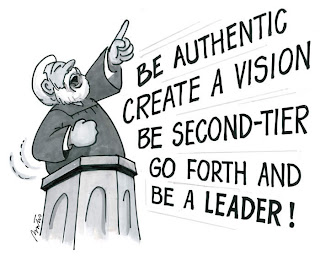Among the other assorted pieces of junk mail waiting for me on my return from down south was this fluff piece from a recruiting firm I know. Well titled but absent much related substance, it's an interview with the last (as in, there won't be any more) CEO of a small public company I ran a few years ago.
It reads like the story of a traffic cop who shows up late to the scene of a head-on and looks for lessons in being a traffic cop, not the head-on.
Which is unfortunate because there are some important lessons about the plight of small caps everywhere.
The first is you don't want to be one. Being a small cap is like running a weather station in the arctic. A few people find your signals interesting but overall, being a small cap means being irrelevant. Which is why if you've made the mistake of becoming one, you'd better have or figure out a way (grow fast or sell) to not be one. Fast.
Secondly, learn to market and sell. In this case the company went public because they needed the cash. They needed the cash because they were way more comfortable inventing new stuff instead of selling what they had. When that happened....when they did start selling what they had...growth and profitability were easy.
Thirdly, it's way better being a company with a unique product that solves a customer need, than being a company with a unique core competency in search of a customer need. In this case - driving laser beams is cool, but the profitable, untapped market applications are all niches, not mass markets...meaning a never-ending search for more places to apply the core competency.
Ultimately, management made the fatal mistake of chasing a saturated, low margin mass-market that sealed its fate.
Finally, bad governance kills - whether you're Goldman Sachs or a company few people have heard of. The governors in this case made a series of questionable calls. A key one was not recognizing early on that selling the company was a legitimate option for creating shareholder value. Ultimately, that is exactly what happened, but years later and at gunpoint/low value. Ultimately, its not clear management or the Board ever recognized the reality of the company's capabilities, it's markets or of being public.
Bottom line. Small caps face the same challenges as all small companies but RUN differently because they're public. For companies who haven't mastered the basic challenges, dealing with the differences can be a killer.
By Jim Crocker, past CEO and now Chair of Boardroom Metrics. Jim works with private and not-for-profit clients on corporate strategy and governance. His partner Karen McElroy leads an international business writing team that helps clients write and win RFP's.
Subscribe to:
Post Comments (Atom)
Leadership Smeadership
Okay. I know it’s a settings thing. Sometime, a long, long time ago – probably when leadership was being invented – I must have indicat...

-
In 2012 I've attended two HR conferences. They couldn't have been more different. The 2nd Annual Talent Management Development C...
-
These Daily Kos posts are just too fascinating to ignore. Electing an African American President, if it happens, will be a big deal....it...
-
Okay. I know it’s a settings thing. Sometime, a long, long time ago – probably when leadership was being invented – I must have indicat...


No comments:
Post a Comment